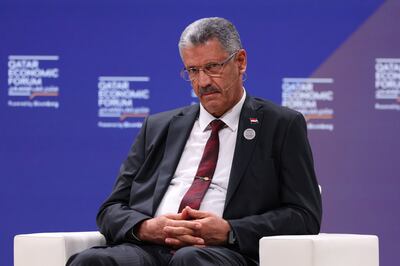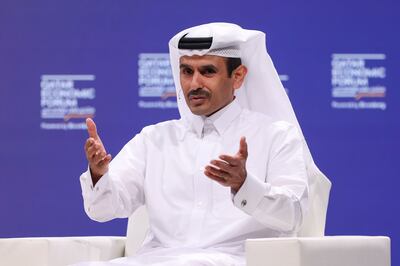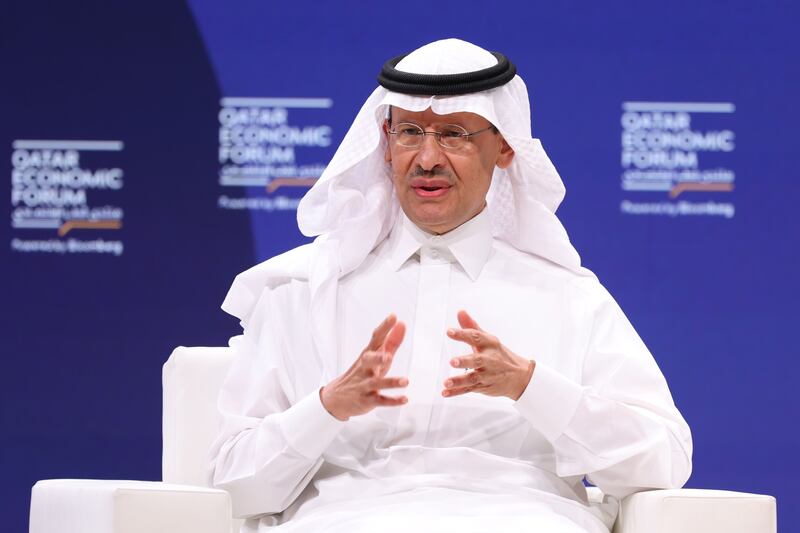The Opec+ group of 23 oil-producing countries will be vigilant and proactive to ensure oil market stability, Saudi Arabia's Energy Minister has said.
“We are dealing with such volatile situations [and] almost all of them have been generated and created [by situations] that we have nothing do with,” Prince Abdulaziz bin Salman said at the Qatar Economic Forum on Tuesday.
Brent, the benchmark for two thirds of the world's oil, has lost more than 12 per cent of its value since the beginning of the year amid demand concerns and a regional banking crisis in the US, which rattled financial markets.
Brent was trading 1.26 per cent higher at $76.95 a barrel at 4.30pm UAE time on Tuesday. West Texas Intermediate, the benchmark for US crude, was up 1.40 per cent at $73.06 a barrel.
Iraq, Opec's second largest producer, is committed to Opec+ supply cuts, the country's Oil Minister Hayan Abdel Ghani said during the same session.
“We are committed to reducing the oil supplies without affecting the world economy. Iraq, despite the economic problems that we have been through, have been committed to abide by the outcomes and the results of Opec meetings,” said Mr Ghani.

Referring to the Opec+ decision to reduce output in October and April, Prince Abdulaziz said the group had acted in a “responsible” and “tentative” way.
“Over the last six to seven months, we have proven to be a responsible regulatory institution … what we need to do in the future is continue delivering in our authority.”
On April 2, Opec+ members Saudi Arabia, the UAE, Iraq, Kuwait, Oman and Algeria announced voluntary output cuts of 1.16 million barrels per day.
Last year, the group agreed to lower its output by two million bpd in response to growing signs of a global economic slowdown.
The Saudi Oil Minister said much of the volatility in the oil market in 2022 was created by the projections and forecasts of the Paris-based International Energy Agency.
“They have proven that it really takes a special talent to be consistently wrong and that's exactly what they have done,” said Prince Abdulaziz.
He also warned oil market short sellers that they could get hurt as traders turn bearish on concerns over a recession and the US potentially defaulting on its debt.
“I keep advising them that they will be 'ouching'. They did 'ouch' in April,” said Prince Abdulaziz.
The remarks come ahead of the group's next meeting on June 4.
Iraq's Oil Minister said Baghdad was still waiting on a final answer from Turkey to resume its northern oil exports through the Ceyhan oil export hub.
“There will be an Iraqi delegation sent to Turkey in order to make sure that export can be possible from this oilfield,” said Mr Ghani.
About 450,000 barrels of oil was trapped in Iraq’s Kurdish region in late March after the International Chamber of Commerce ruled on a long-standing complaint from Baghdad against solo export by the region.

Meanwhile, Qatar is “on track” to raise its liquefied natural gas production capacity to 126 million tons per annum by 2027 amid surging global demand, according to Saad Al Kaabi, Qatar's Energy Minister.
Qatar, which signed a 27-year LNG deal with China in November, is “busy” negotiating with potential buyers, he said.
Mr Al Kaabi also said the “worst is yet to come” for Europe, as an unusually warm winter resulted in lower electricity demand.
Europe, faced with dwindling supplies from Russia, made it through the winter without an energy crisis as it faced less competition for LNG cargoes from China, whose economic growth was affected by strict Covid-19 curbs.
China, the world’s second-largest economy, reopened its borders in January and is expected to be a big driver of energy demand this year.






